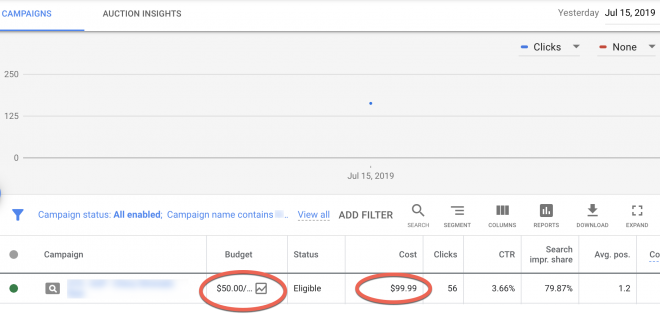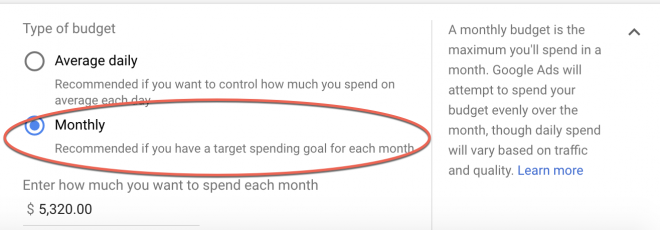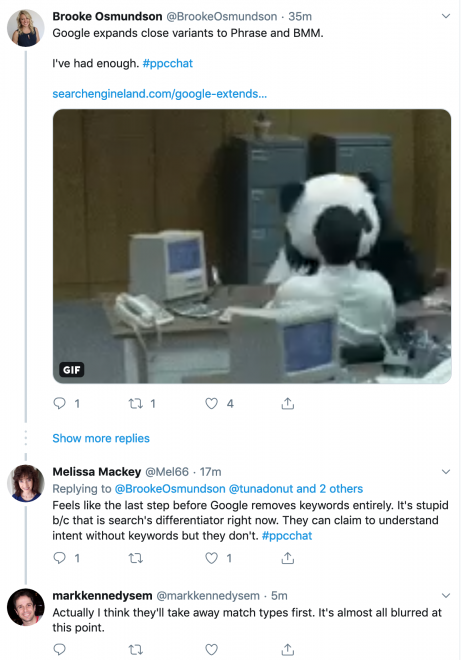Your PPC campaigns might be running perfectly fine right now.
But someday, you might suddenly find yourself entangled in something you didn’t anticipate.
You’ll have to struggle to free yourself before you lose sight of your goals – or your results sink.
Snags can happen anytime in your PPC programs.
You’re most susceptible to these snags when you’re new to paid search advertising.
When you know where the snags are hiding, you can take proactive steps to avoid them.
This article will help clear the PPC waters for you.

1. When a Daily Campaign Budget Really Isn’t a Daily Campaign Budget
Google Ads allow you to set a maximum daily campaign budget amount.
A reasonable person would take that to mean once you’ve spent your max budget for the day, no more would be spent.
But a reasonable person would be wrong.
In October 2017, Google Ads changed its rules so that your campaigns can spend up to twice your average daily budget.
The “max daily budget” is now something that is calculated and applied over the course of a month, not day by day.
In other words, Google calculates your monthly charging limit, which is the average number of days in a month multiplied by your average daily budget. And then they promise to not go over that over the course of a month.
Let’s illustrate with a few screenshots.
We’ve set a $50 budget in the example below:

When we drill down into the account, we see the “disclaimer” text when we set our budget.

In theory, this means you could open your campaign mid-month and discover you’ve spent already your entire monthly budget.
(Of course, we don’t recommend waiting until the middle of the month to look into your account. You should really monitor it daily. But if you’re trying to manage your PPC accounts on your own, it can happen.)
As you can imagine, this would be a nasty surprise if you don’t know how the “daily campaign budget” works.
This is also problematic if you pause your campaign in the middle of a month. You may find you’ve already spent your entire monthly budgeted allotment before you hit pause!
As a workaround, you might be tempted to cut your budget in half. You don’t want to risk spending $100 a day when you only want to spend $50, so you set your daily campaign budget to $25. But that’s not a great solution either.
I can understand why Google made this change. Campaigns naturally experience spikes and lulls in daily activity, so having flexibility in how the budget is applied sounds like a good thing.
But I’m not sure that this approach is the best solution – especially when it’s so misleading.
Perhaps a better solution would be to allot a maximum budget for an entire campaign. But so far, that capability is limited to video campaigns with specific stop and start dates.
However, the rules and capabilities remain fluid. Just the other day I noticed that one of our accounts now has an option of setting a monthly budget for search campaigns – an option that wasn’t available before:

(I checked a couple of our other accounts, and they still don’t have this option. The change is so new that, at the time of writing, Google hasn’t updated the Google help file yet. It will be exciting to see where this goes!)
2. When an Exact Match Really Isn’t an Exact Match
Once upon a time, an “exact match” in Google Ads keyword matching options was exactly that – an exact match.
The match had to include the specified keywords, only those words and in the same order for an exact match to be made.
So the keywords “athletic shoes women” would only impression under exact match if “athletic shoes women” was the search term.
But times have changed.
Some time ago, Google updated its exact match rules to allow close variants. Those variants allowed for changes in word order or slight variations in spelling.
But since September 2018, exact matches can now allow for keyword variations that share the same meaning.
Today, ads with the keywords “athletic shoes women” could conceivably impression for the following search terms:
- Women athletic shoes (different word order)
- Athletic shoes for women (includes “for”)
- Sports shoes women (similar meaning)
- Women’s runners (similar meaning)
If you were using exact match as a way to minimize irrelevant ad clicks, you now have a problem.
You might be able to compensate by adding to your negative keyword list like crazy.
Another option we used to suggest was using “phrase match” as an alternative because it wasn’t included in this “close variants” update. But unfortunately, that option also changed recently – right while I was finishing off this article!
As of July 31, close variants will also apply to broad match modifier and phrase match keywords.
With this change, I really don’t get the point of match types anymore. It’s a feeling that’s shared by other PPC pros. And I agree with Mark Kennedy that match types will eventually go away entirely:

3. When Good Advice Really Isn’t Good at All
I hate to say it, but it’s true: You can’t always rely on the guidance you get from Google Ads reps.
Our experience with Google Ads reps has been running hot and cold. When we call for assistance, sometimes we’ll reach a rep who really knows what he/she is talking about. And it’s awesome!
But more often, perhaps 85% of the time, we end up talking to reps who don’t have the expertise we need.
I’m sympathetic. I have no doubt that these are good people who are doing the best they can.
And I’m sure that Google, just like every other business, is struggling to find employees with the right kind of experience. And getting those employees up to speed must also be a huge challenge.
I’m also led to think that this is a hiring/training issue because the balance of good-bad advice comes in waves.
We’ll go through a few days or weeks of getting really good advice, followed by weeks or months of really bad advice. So maybe it fluctuates with the hiring cycle.
Regardless of the source of the problem, I cringe to think of people following this advice blindly. (It happens all too often. Most of our clients have horror stories about the time they took bad advice from a Google rep.)
Fortunately, I work with an experienced team of PPC pros, so we’re in a position to carefully assess the advice we get.
Whenever a new team member talks to Google, we always ask him/her to check in with the rest of the team before following the rep’s advice.
Unfortunately, not everyone has this kind of in house expertise. Still, it’s worth knowing that the advice you get from Google might not be the advice you should follow.
Do your research and talk to anyone you can before proceeding!
Keep Your Eye on the Water!
Don’t let the calm waters of PPC fool you.
Things can change quickly. Problems can quickly develop under the surface.
So arm yourself with foresight and knowledge – and watch for snags so you can drift on by them.
This article was originally published in Search Engine Journal.






